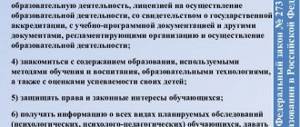Responsibilities of parents to raise children
The rights and responsibilities of parents in the upbringing and education of children are regulated not only by domestic legislation, but also by the UN International Convention on the Rights of the Child.
Any person tries to convey to his child the simple truth that he must be responsible for his actions and actions. True, often even parents forget that they must bear their own responsibility for their own children, and deliberately shift personal responsibilities to teachers, educators or the children themselves.
Article 63 of the RF IC discusses the main responsibilities of parents that relate to the upbringing and educational processes. In accordance with the established provisions, parents are responsible for the upbringing of minors. Therefore, first it is necessary to clarify what the term “parental responsibility for upbringing” itself includes. This concept consists of several main points:
- Caring for the comprehensive development of the child, and in particular, in the spiritual, psychological and physical aspects. Parents undertake to provide the child with the opportunity to receive a general education, and all children are required to attend educational institutions;
- Protecting the interests of the child. Parents act as official representatives of the interests of their own child before the law. Therefore, when the need arises, they are obliged to defend his interests and protect his rights;
- Security. In accordance with this point, parents must provide the child with a safe environment for development and life, without using physical punishment and moral pressure as tools of control;
- Financial support for the child. Until the child reaches the age of majority (18 years), the parents are obliged to support him;
- Child education. In this category, special attention should be paid to the responsibility of parents for the behavior of their children, since their educational process will subsequently be reflected in the child’s behavior not only in the family, but also in society.
The Convention on the Rights of the Child, as well as internal regulations of Russian legislation, stipulate that the primary responsibility for raising children lies with the parents, and the interests of the child must come first for his father and mother.
If it is established that the duties of the parents are not fulfilled properly or that there is a violation of the rights of the child, then in this situation the responsibility of the parents may become legal. Almost every segment of the law has provisions that regulate the responsibility of parents to their children:
- Civil legal framework (Article 1073-1075 of the Civil Code of the Russian Federation);
- Administrative law (Article 5.35 of the Code of Administrative Offenses of the Russian Federation);
- Family law (Article 69, 73 of the RF IC);
- Criminal legislation (Article 156 of the Criminal Code of the Russian Federation).
The provisions and standards listed above provide for measures of parental responsibility for improper performance of personal responsibilities in relation to their own children.
Main provisions of the Convention: summary
All countries that have adopted the Convention must comply with its provisions. An international legal act consists of three main parts, so it is necessary to become familiar with each of them.
First part
Let's take a look at the summary of the articles listed in the first part:
- Articles 1-4: define the concept of “child”, and also state that the interests of minors are higher than the needs of society. States that have adopted an international legal instrument undertake to ensure compliance with its principles.
- Articles 5-11: contain the most important interests of the minor. Namely, the right to:
- life;
- Name;
- receiving care and education from parents;
- receiving free medical care.
- Articles 12-17: define the rights of children to express their own opinions, freedom of thought, and receive the necessary information.
- Articles 20-27: define the interests of special categories of children. We are talking about persons left without the guardianship of biological parents. The state is obliged to protect such children, take care of them, and give them the opportunity to find a new family.
Refugees also belong to a special category of children, even if they crossed the border with their parents. A minor can count on receiving humanitarian assistance.
- Articles 28-31: secure the rights of children to a standard of living necessary for the mental, physical and spiritual development of the minor.
- Articles 32-36: the state is obliged to protect children from illegal employment, alcohol and drugs, kidnapping and slavery. If a minor is subject to economic exploitation, which interferes with the acquisition of school knowledge, this will negatively affect his mental and mental development. The state sets the minimum age at which a citizen can get a job.
If a minor is involved in criminal activity, the guilty person will bear criminal liability. This also applies to cases where a child is forced to take drugs or alcohol.
Articles 37-40: define the rights of an offspring who ends up in prison or a war zone. A minor cannot be executed, imprisoned for life, or subjected to torture.
According to international law, a child is a citizen under the age of 18.
Second part
The second part contains articles 42-45. They determine the size of the Committee, its responsibilities and structure. Also, one of the articles indicates the child’s right to begin working at the age of 14.
The second part also talks about how States Parties to the Convention exchange information with each other.
Every 4 years the Committee is elected. His main responsibility is to consider complaints about cases of violation of the interests of minors. If the complaint was not anonymous, the Committee has the right to investigate the specific situation.
Since 2014, minor citizens whose interests have been violated can file a complaint with the Committee for the Protection of Rights and Freedoms.
The third part
The third part contains articles 46-54. They determine the procedure for solving procedural and legal problems of compliance by the state with the provisions of an international legal act. One of the articles states that any state can accept the Convention, and it does not have to be a member of the UN.
A state that has adopted the Convention may at any time cease to support the principles of protection of minors. To do this, it must withdraw from the list of supporters of this international legal document.
Right to education
The international legal act states that the offspring has the right to receive free primary education. It must be accessible to all segments of society. The state also strives to provide citizens with the opportunity to obtain secondary and higher education.
One of the main goals of the international document is to overcome illiteracy of the population, as well as to ensure that all citizens receive the latest scientific and technical knowledge.
Raising a minor
An international legal document stipulates that when the offspring reaches a certain age, he will be able to express his opinion when resolving intrafamily issues. Also, the child’s position will be taken into account at court hearings if his interests are affected.
The international legal document states that the offspring has the right to see his relatives. The exception is cases when such meetings harm a minor.
The rights of children with any disabilities should not be infringed. They can also have a family, receive education, medical care, etc.
The right of parents to educate their children
An important component of the educational process, as a result of which a child is formed as a person, is his receipt of general education. The responsibility of parents to ensure their children the right to receive a quality education is enshrined in the Constitution of the Russian Federation (clause 4 of article 43).
In accordance with paragraph 2 of Article 63 of the UK, a constitutional norm was legitimized regarding the current responsibilities of parents to ensure that their descendants receive a general education. In addition, it is assumed that education must necessarily ensure the formation in every child of an adequate picture of the world, which corresponds to the modern level of knowledge. This will help shape the child’s personality and provide modeling of a behavioral model that will be acceptable not only for the family, but also for society as a whole.
Education itself is directly aimed at achieving such main goals as:
- Personality development and the formation of normal child behavior in society;
- Development of personal talents and recognition of the child’s abilities;
- Instilling in a child the concept of respect for human rights and fundamental personal freedoms;
- Forming a respectful attitude towards the culture and traditions of not only your country, but also all countries of the world;
- Development of a normal respectful attitude towards basic legal norms;
- Preparing the child for a conscious life in terms of mutual equality and respect;
- Thrifty attitude towards nature.
General education is compulsory, and if parents are unable to ensure the fulfillment of this right, then in accordance with current legislation they may be held liable. It is worth clarifying that the right of parents to choose an educational program is considered unquestionable. Consequently, it is the parents who decide how their children will receive general education - in special educational institutions or at home.
List of international legal documents defining children's rights
Declaration of 1924 and 1959
In fact, the very first document was the Geneva Declaration of the Rights of the Child, adopted in November 1924. The main message of the document is “a child is not a commodity.” This was the first attempt at the international level to protect minors, improve their situation, and combat child labor and slavery.
The Declaration contained five principles:
- a minor must have opportunities and means for his physical and spiritual development;
- to feed a hungry child, to help a sick child, to shelter an orphan, to correct a mistaken child;
- in difficult times, first aid for children;
- it must be protected from any form of exploitation;
- kids need to be raised with the idea that they should benefit other people.
In 1959, the UN General Assembly adopted a new Declaration, in which everyone who in one way or another has some influence on the lives of minors - governments, local authorities, parents, public organizations - is called upon to recognize the freedoms of young citizens and respect them.
The Declaration especially emphasizes that rights and freedoms apply to all children without exception, regardless of gender and race, religion and health status, social and financial status of the family.
Ten basic principles declare the rights of minors to:
- name and nationality;
- love, care and understanding of parents and other family members;
- material security and social protection;
- education and health care;
- education and development;
- protection from any form of exploitation, cruelty and humiliation.
1989 UN Convention
The 1989 Convention deepens and expands the list of provisions defined in the Declaration. Here, much attention is paid not only to basic human rights (to life and material support), but also to the social and moral aspects of education and development, and special care for children who find themselves in difficult life situations.
The Convention ensures the rights of the child in several ways:
- basic - the inalienable right to life, to a name and citizenship, the right to know your parents and live in a family, surrounded by care and love, to housing, food and clean water, to medical care, to protection from violence;
- social – to receive an education, to decent physical, intellectual, spiritual development, to freedom of conscience and religion, the right to have one’s opinion and express it freely, to privacy;
- in difficult situations, children left without parental care, orphans or refugees have the right to special assistance and support from the state; children with disabilities or with a special level of mental or physical development should be integrated into society as much as possible; they have the right to additional social benefits.
Expert opinion
Maria Lokshina
Family law expert since 2010
The Convention insists that parents or persons in their stead have the responsibility to raise children to respect other people, their freedoms and culture. Young citizens must be prepared to live in a society with a spirit of equality, tolerance and acceptance.
UN Standard Minimum Rules for the Administration of Juvenile Justice
Until the age of eighteen, a person is considered a minor, not yet fully formed morally and mentally, therefore, if he commits an offense, a reduced punishment is applied to him, aimed, rather, at correcting behavior rather than at punitive measures.
In 1985, the UN adopted the so-called Beijing Rules - recommendations to member countries, which define the concepts of juvenile delinquency, the goals of justice in relation to them, the age of criminal responsibility of minors, possible sanctions, as well as the principles of adjudication and the choice of sanctions.
Based on these rules, the legislation of the participating countries has adopted special criminal legal regimes for minors.
World Declaration on the Survival, Protection and Development of Children
In September 1990, in New York, at a special meeting dedicated to the interests of minors, issues such as children's vulnerability and constant exposure to danger were raised.
These are wars and famines, racial discrimination and poverty, malnutrition and disease, adult cruelty or negligence.
Since, by uniting, countries can implement programs that provide young citizens with the basic needs of survival, at this meeting a corresponding Declaration was adopted, obliging participants to take measures to restore economic growth, reduce hunger, spread education, strengthen medical care, and care about the environment.
The main task was the complete ratification and implementation of the provisions of the Convention in all countries without exception.
Transferring a child to other relatives
The main responsibility of any parent is to ensure the educational and educational process for their own children. If for some reason the parents do not ensure the observance of the child’s rights, then they may be deprived of them, and the child will be transferred to the responsibility of close relatives who will act as guardians, foster families or the state.
According to the law, the transfer of a child to be raised by other relatives can only be carried out in relation to those children who were left without guardianship and trusteeship from their own parents. Often, this arises in situations where parents have been deprived of their existing parental rights, or for some reason are unable to fulfill their obligations towards the child.
The biological parents have the priority right to raise a child. And if they are deprived of this right, then the responsibility for raising and educating children can be assigned to their closest relatives, but only with their written consent and permission from the guardianship and trusteeship authorities.
If the child is currently being transferred to relatives for upbringing, then it is worth understanding that the fundamental rights and freedoms of the child do not disappear anywhere, and all responsibilities in relation to the minor will be transferred to his guardians.
Regarding the issue of material support, when transferring a child to close relatives, they are responsible for the full provision and maintenance of the child. However, according to the law, guardians have the right to receive financial assistance from the state.
It is worth noting that the transfer of a child to another family cannot be done unilaterally. This is possible only at the request of the guardianship and trusteeship authorities, at the written request of the guardians and with the help of the courts. It is the court that will make the final decision and confirm the transfer of parental responsibilities to the guardian.
Structure
The structure of the Convention on the Rights of the Child consists of the following sections. The preliminary part or preamble tells the history and reasons for the creation of the document. 54 articles containing the rights that children acquire from the date of their birth, as well as the responsibilities of the state in relation to them and the methods of their implementation:
- Articles 1 to 4 reveal the concept of a child;
- Articles 5 to 11 reveal the inviolable and inalienable rights of children;
- Articles 12 to 17 set out the rights to express opinions, views and participate in associations;
- Articles 18 to 20 cover parental responsibility and protection from neglect;
- Articles 20 to 26 regulate the rights of children of special categories;
- Articles 27 to 31 inform about the need to obtain education and have rest;
- Articles 32 to 36 regulate state protection from exploitation, violence, drugs, etc.;
- Articles 37 to 40 regulate the rights of a child if he or she has committed an offense;
- Articles 41 to 45 determine control over compliance with the provisions of the act;
- Articles 46 to 54 define the procedure for signing and accepting the terms of the Convention.
Read also: Guest marriage
Convention on the Rights of the Child
The UN Convention on the Rights of the Child is a specialized legal document that plays an international role and predetermines the rights of minor children that must be guaranteed in the countries participating in the signing of the document. All UN countries except the United States took part in the document signing process. The UN Convention on the Rights of the Child is a basic normative act that covers the full range of legal guarantees for minors.
The UN Convention on the Rights of the Child includes 54 articles that detail the individual freedoms and rights of all citizens, whose ages can range from birth to 18 years (the age of majority may vary in different countries).
The UN Convention on the Rights of the Child, its first part, completely deciphers the concept of the word “child”, and also regulates the primacy of interests and basic rights and freedoms of children. The second part of the document, the UN Convention on the Rights of the Child, clarifies the features of the structure and functions of the Committee on the Rights of the Child, and also entrusts state bodies with the task of implementing the decisions of this institution. The third part of the UN Convention on the Rights of the Child sets out ways to resolve various procedural legal problems by public authorities that arose in the process of applying the articles of this document.
The UN Convention on the Rights of the Child was drafted in accordance with basic democratic principles, including:
- Absence of any kind of discrimination. The UN Convention on the Rights of the Child prohibits neglect of a child on various individual grounds: nationality, language, religious preferences, ethnic origin and social status, health status, political views and personal preferences;
- Supremacy of interests. The UN Convention on the Rights of the Child regulates the observance of the interests of minors in the process of making any decisions that affect the lives of children;
- The highest quality of life, development and protection. Society and government agencies must guarantee minors the full realization of their physical, social and spiritual potential;
- Every possible participation in the life of the younger generation: parents, adult citizens and government authorities must constantly participate in making any decisions, as well as ensure that opinions are taken into account when deciding the future fate of young citizens.
The UN Convention on the Rights of the Child guarantees minors the opportunity to receive free basic education. To implement the goals of the document, government bodies of the participating countries must develop various types and levels of the educational system. The UN Convention on the Rights of the Child also includes articles on raising children in the family. The process of raising children must be controlled by parents or legal guardians, who must fully comply with all the requirements and interests of the child.
The international convention, which clarifies the basic rights and freedoms of children from the countries participating in the signing of the document, is an innovative solution to the problem of the full realization of the younger generation. Many of the rights in this document were introduced for the first time, so compliance with the basic articles of the convention ensures the full development of the personal and physical qualities of children, worthy education of respect for society and the environment.
History of creation
The Convention was adopted in 1989 by the United Nations. However, the document came into force only in 1990.
The predecessors of the Convention were the following documents:
- 1924 - Geneva Declaration.
- 1948 - Universal Declaration of Human Rights.
- 1959 - Declaration of the Rights of Minors.
General compulsory education
In accordance with the main constitutional norms and basic legislative provisions, all citizens of Russia have the right to receive general education. This right comes to everyone in childhood, and must be ensured by the child’s parents.
In accordance with the Law “On Education in the Russian Federation,” primary, basic and secondary education is considered compulsory. Thus, in accordance with this standard, all children are required to go to school and receive a general education, and their parents are obligated to monitor the implementation of this right.
At the same time, the law provides that it is parents who have the right to decide how their children will receive the basics of education. According to the decision of the parents, the child can receive education at home or in public or private educational institutions. It is worth noting that home schooling must be agreed upon with the guardianship authorities so that no difficulties arise in the future.
Author of the article
Convention in Russia
In Russia, the Convention entered into force on August 23, 1993. This fact is enshrined in Decree of the Government of the Russian Federation No. 848.
Also in Russia, the rights of a minor citizen are regulated by the following legal acts:
- Constitution of the Russian Federation.
- Family Code of the Russian Federation.
- Legislation of the Russian Federation on protecting the health of citizens.
- Federal Law “On Education”.
- Law on basic guarantees of children's rights in the Russian Federation.
- Law on additional guarantees for the protection of orphans.
- Federal Law “On Guardianship and Trusteeship”.
Russia annually compiles a document that reflects the measures taken by the country to maintain the provisions of the Convention. It is sent to the UN for consideration.







